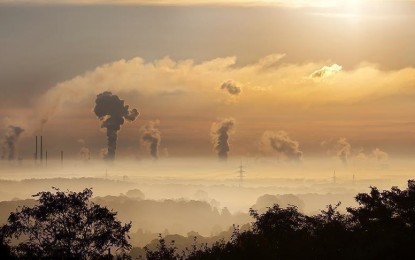
ANKARA – Global carbon dioxide (CO2) emissions from fossil fuel combustion are expected to increase by less than 1 percent this year with the large expansion in renewables and electric vehicles preventing sharp emission rises, a new analysis from the International Energy Agency (IEA) revealed Wednesday.
The marginal increase in CO2 emissions by 300 million tons this year to 33.8 billion tons relative to the 2-billion ton increase last year is driven by power generation and the aviation sector.
However, were it not for major developments in renewable energy technologies and electric vehicles, the rise in global CO2 emissions would be much higher, more than tripling to 1 billion tons, the IEA found.
Global renewable electricity generation this year is forecast to see the largest annual rise on record to over 700 terawatt-hours, and without this growth, global CO2 emissions would be more than 600 million tons higher this year.
Despite concerns about the effects of the current energy crisis, which has increased global coal demand, the increase in CO2 emissions is only a small fraction of what it was last year.
"Global energy trends have also been affected this year by the impacts of Russia's war on the world economy, which have significantly dampened expectations for economic growth, notably in Europe," it read in the report.
The IEA forecasts a slight improvement in the CO2 intensity of the world's energy supply this year, resuming a years-long trend of consistent improvement that was disrupted last year by the coronavirus disease 2019 (Covid-19) crisis's emissions-intensive economic recovery.
"While electricity generation from both wind and solar PV is growing far more than any other source in 2022, coal is expected to post the next largest increase as some countries revert to coal use in response to soaring natural gas prices. In total, global CO2 emissions from coal-fired power generation are set to grow by more than 200 million tons, or 2 percent, this year, led by increases in Asia," the IEA said in the report.
Fatih Birol, the IEA's executive director, said the global energy crisis triggered by Russia's war against Ukraine has prompted a scramble by many countries to use other energy sources to replace the natural gas supplies that Russia has withheld from the market.
"The encouraging news is that solar and wind are filling much of the gap, with the uptick in coal appearing to be relatively small and temporary. This means that CO2 emissions are growing far less quickly this year than some people feared and that policy actions by governments are driving real structural changes in the energy economy," he said.
"Those changes are set to accelerate thanks to the major clean energy policy plans that have advanced around the world in recent months,” he added.
CO2 emissions in the European Union are on course to drop this year despite an increase in coal emissions which is expected to be temporary.
China's CO2 emissions are set to remain flat this year due to weaker economic growth, impacts of drought on hydropower and major deployments in solar and wind.
Furthermore, the IEA said an expected decline in global natural gas use as a result of Russia's war in Ukraine could result in a CO2 emission reduction of around 40 million tons this year, while oil-related CO2 emissions are expected to rise by around 180 million tons as demand for oil grows faster than demand for any other fossil fuel. (Anadolu)
